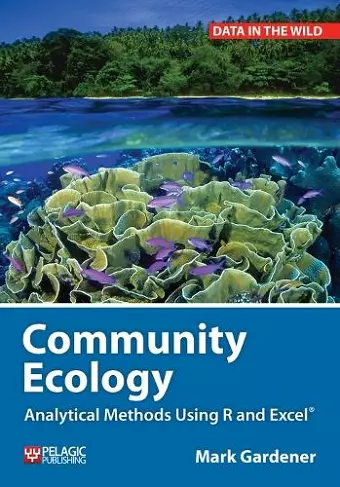Community Ecology
Analytical Methods Using R and Excel
Format:Hardback
Publisher:Pelagic Publishing
Published:1st Feb '14
Currently unavailable, and unfortunately no date known when it will be back
This hardback is available in another edition too:
- Paperback£39.99(9781907807619)

Interactions between species are of fundamental importance to all living systems and the framework we have for studying these interactions is community ecology. This is important to our understanding of the planets biological diversity and how species interactions relate to the functioning of ecosystems at all scales. Species do not live in isolation and the study of community ecology is of practical application in a wide range of conservation issues.
The study of ecological community data involves many methods of analysis. In this book you will learn many of the mainstays of community analysis including: diversity, similarity and cluster analysis, ordination and multivariate analyses. This book is for undergraduate and postgraduate students and researchers seeking a step-by-step methodology for analysing plant and animal communities using R and Excel.
Microsoft's Excel spreadsheet is virtually ubiquitous and familiar to most computer users. It is a robust program that makes an excellent storage and manipulation system for many kinds of data, including community data. The R program is a powerful and flexible analytical system able to conduct a huge variety of analytical methods, which means that the user only has to learn one program to address many research questions. Its other advantage is that it is open source and therefore completely free. Novel analytical methods are being added constantly to the already comprehensive suite of tools available in R.
Mark Gardener is both an ecologist and an analyst. He has worked in a range of ecosystems around the world and has been involved in research across a spectrum of community types. His knowledge of R is largely self-taught and this gives him insight into the needs of students learning to use R for complicated analyses.
Following an intuitive thread from data entry through to analysis and interpretation, this is intended as a comprehensive course in the main methods of community analysis, both traditional and current. The intimidating length can largely be attributed to the numerous worked examples with full output. Some techniques are demonstrated in both Excel and R, which seems superfluous, since the latter is almost invariably superior. I would have liked more on GREP, an invaluable tool for checking and formatting data, and a notable weakness of Excel. Overall this is a useful resource for postgraduate students, but it could have been more concise and selective.
-- Markus Eichhorn * Frontiers of Biogeography *Without a doubt there is a challenge here since Gardener seeks to enlighten the reader about both community ecology as a topic (although he admits in the foreword that this is not exhaustive) and the analytical techniques needed to successfully study it. This is a feat which I felt that he managed reasonably well. I find his style easy-going and he does well at not assuming the reader has expert knowledge. The book follows a logical path and is packed with reassuring screen shots and coding advice. The fact that it is written by an ecologist makes the data relevant to biologists and it all seems easy to follow, specimen data are again provided on the website. Gardener offers alternative analyses for each type of data, explains clearly when he thinks a particular analysis is most useful and then encourages the reader to ‘have a go’.
-- Mark Edwards * EcoBloggiISBN: 9781907807626
Dimensions: unknown
Weight: 1100g
556 pages